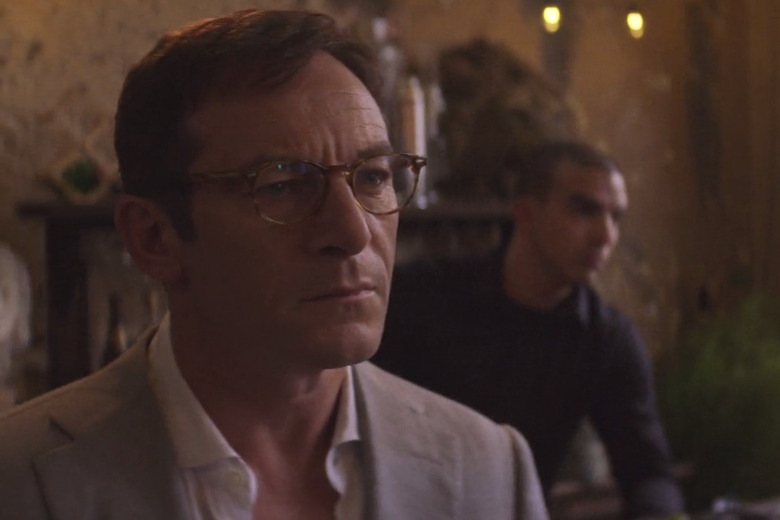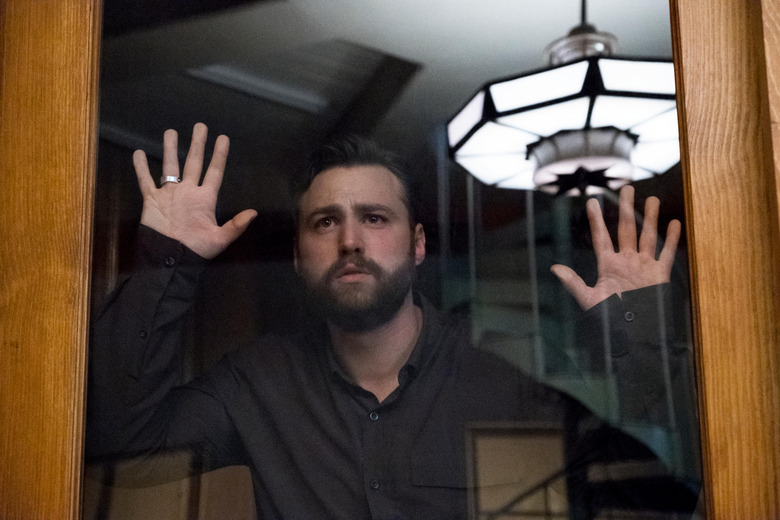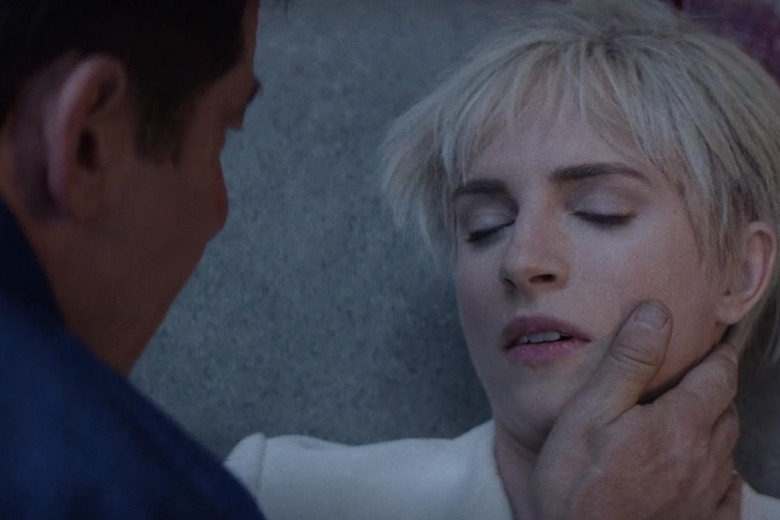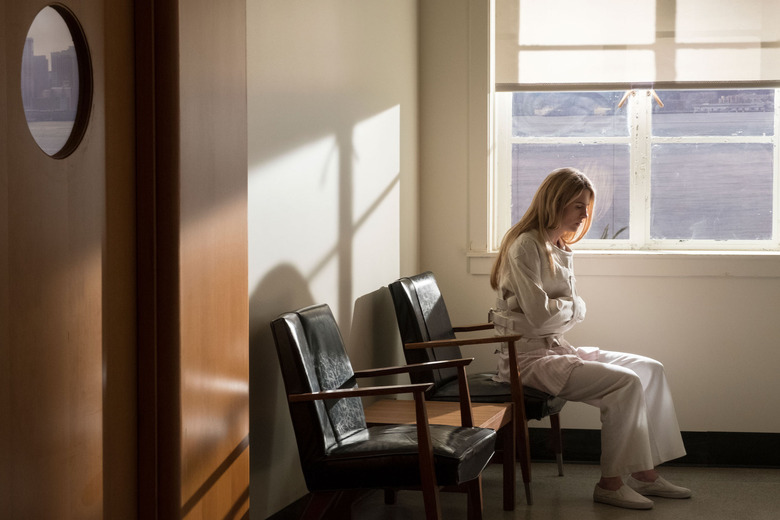'The OA: Part II' Spoiler Review: Let's Talk About The Telepathic Octopus (And That Equally Bonkers Ending)
Netflix's The OA seemingly came out of nowhere when its first season dropped in December 2016 with little in the way of promotional pageantry save for some questionable last-minute tweets. Created by Brit Marling and Zal Batmanglij — the duo behind the films Sound of My Voice and The East — the show almost literally became an overnight sensation thanks to its same-day release of eight easily binge-able episodes. Bizarre yet absorbing, perhaps earnest to a fault, it wore its aspirations on its sleeve, probing the mystery of near-death experiences and leading viewers on a merry chase through a garden of forking narrative paths.
Now The OA is back with a second season ("Part II") that doubles down on all the eccentricity of the first and sees it joining the ranks of dimension-hopping shows with elaborate mythologies, such as Twin Peaks, Lost, The Leftovers, Legion, and Castle Rock. If you thought the sight of basement prisoners and cafeteria kids engaging in synchronized, choreographed "movements" (don't call it interpretative dancing) was wacky and woefully ill-advised, The OA: Part II wants you to know that you ain't seen nothing yet.
Have you been practicing the movements in front of the mirror at home for the last two-plus years? Has The OA: Part II left you scratching your head this week with its telepathic octopus digressions and yet another contentious, downright bonkers season finale? Fear not, recovering cult TV show watchers: we've got your exit counseling (with heavy spoilers) right here.
Belief vs Doubt
The OA: Part I mined tension on two fronts. First, there was its flashback storyline about a scientist named Hap — played by Jason Isaacs — holding survivors of near-death experiences (NDEs) captive in glass cells in his basement. Then, there was its present-day storyline, with a kidnapped woman, Marling's character, Prairie, returning home, mysteriously cured of her blindness.
Much of the tension in this latter part of the narrative arose out the interplay between belief and doubt, with a group of local kids getting caught up in Prairie's teachings as the OA (an acronym that was already spoken for by the twelve-step program Overeaters Anonymous, but that the show in its tunnel vision sought to redefine as "Original Angel.") For all we knew, the kids' and OA's whole quest to open a portal to another dimension together could have just been a shared delusion.
The show left open the possibility that Prairie had used a box full of books to invent her story—with her fixation on the name Homer coming from the author of The Iliad and not from a star-crossed lover in the glass cell next to hers. In the finale, the kids used the movements to avert a deus ex machina school shooting, but not before Prairie took a fatal shot to the chest.
The ending was controversial, even before the real-life school shooting last year in Parkland, Florida put student activists like Emma Gonzalez and David Hogg in the national spotlight. It's hard not to have the thought of that event enter one's mind, at some point, at least, during The OA: Part II as the story picks back up and has strangers in Goodwill centers recognizing the kids like celebrities.
What's crucial is that the end of Part I left the tension over Prairie's sanity (or lack thereof) unresolved. Ultimately, the viewer had to decide what he or she believed was true.
With Part II, we're now in an alternate reality and the fundamental driving question of the first season is gone, as we now know that Prairie is not just a delusional trauma victim spinning some cockamamie story. She's actually done what she thought she could and consciousness-jumped into a parallel universe, one where it's 2016, Joseph Biden is President, and no one has heard of Barack Obama.
To compensate for the resolved sanity question, the show introduces a new mystery element into its second season as a detective (Kingsley Ben-Adir) investigates the disappearance of a girl, which is linked to an augmented reality game. Meanwhile, doctors flag Prairie's reality-jump confusion as a disassociative episode and she lands herself in a psychiatric clinic headed by none other than Hap, the same scientist who imprisoned her before.
A TV Blind Date Gone Wrong
There's a scene in The OA: Part II where Homer's alternate-reality self is on a blind date. It seems like it's going well at first, but toward the end, he does a couple of things that are turn-offs: being too exact about splitting the bill and then making an ingratiating attempt at humor. His date gives him this look where you can tell she's decided, right then and there, that she's not really into him.
That scene is a microcosm for the experience that some viewers may undergo with this show. By my count, The OA has already had at least three solid jump-the-shark moments in its 16-episode run. Depending on how hard up you are for a good TV date, you might be willing to forgive things like the dance-off against a school shooter in favor of the show's other redeeming qualities. I know that's how I felt going into Part II.
The second season almost seems like it wants to invent new terms that will render old ones like "jumping the shark" and "nuking the fridge" quaint and obsolete. When a telepathic octopus named Azrael, or Old Night, wraps its tentacles around a Russian blonde woman in a red dress and encourages her to confess her true nature as an interdimensional traveler on stage, you know you've wandered into something weird.
Undoubtedly, that weirdness is part of the appeal for some viewers of The OA, but for me, the octopus scene was the tipping point where I went from being patient with the show and intermittently enjoying it to resenting it. I say that without any high and mighty critical intent, but just as a viewer who has watched episodes of wildly variable lengths spread out over 875 minutes, or fourteen and a half hours.
As the octopus feels up Prairie, or OA, or Nina, or whatever she's calling herself these days, it telepathically says, "My brothers and sisters in the sea think communicating with your kind is a waste of time." Soon it asks her permission to kill her for 37 seconds.
Maybe it's just the tentacle porn overtones, but it sounds like they tried to give the octopus a Japanese voice. I found myself thinking, "C'mon, now. Why's he's gotta be Japanese?" It reminded me of Nute Gunray, an obscure character from Star Wars: The Phantom Menace with a stereotypical Asian accent. Now's as good as time as any to point that the repetition of the soundalike name "BBA" in The OA constantly invokes the image of a soccer ball droid named BB-8.
I should stress that The OA plays scenes like the octopus groping in the most straight-faced manner possible. If anything, that might be the show's fatal flaw: how utterly po-faced and lacking in self-awareness it is. If the show had more of a sense of humor about some of the off-the-wall things it presents, one might be inclined to go along with the zaniness a little longer.
Where Have We Seen This Ending Before?
Back in late January, /Film's Hoai-Tran Bui wrote about how the new movie Serenity already had the wackiest twist of 2019, even though we were only a month into the year at that point. For some viewers, the ending of The OA: Part II might be a contender for the new wackiest twist of 2019.
At the end, Prairie/OA/Nina jumps to an alternate dimension yet again, just as she did in the finale of Part I. It seems entirely possible that this is how every season of the show will end, by jumping to a new reality so it can reinvent itself next season.
The twist is, Prairie and Hap wake up in the real world. This time, they've really gone and done it by jumping to our reality, where they're actors on a film set, presumably shooting a Netflix show called The OA.
OA is addressed as "Brit," as in Brit Marling, and Hap comes right out and says, "I'm Jason Isaacs," as in, the actor who played Lucius Malfoy in the Harry Potter movies and Captain Lorca on Star Trek: Discovery. (As they say on the BBC, hello to Jason Isaacs.)
This real-world film set twist might be more shocking if it didn't bear a certain resemblance to one of the multiple endings of another high-profile Netflix show that literally just hit the streaming service a few months ago. What we're left with in The OA: Part II is a gimmick finale that looks novel on its surface until you stop to ponder the full implications of what the show might look like next season.
Are viewers really prepared to sit through another whole season as Brit Marling goes full M. Night Shyamalan and writes herself into the show as a version of this all-important character, the Original Angel, OA? If that seems like an unfair comparison, consider the fact that Zal Batmanglij directed a couple of episodes of the series Wayward Pines, which was instrumental in helping rescue Shyamalan from movie jail.
Shyamalan's had one hell of a bumpy filmography and The OA has already established itself has one hell of a bumpy show. It, too, suffers from a painful undercurrent of narcissism, one that's centered on a beautiful woman who serves as writer-showrunner-star, much like Shyamalan has served as writer-director-actor on some of his films.
Frequently frustrating, The OA is never less than ambitious, but maybe it reach exceeds its grasp ... especially if that reach will see the show morphing into The Buried Secret of Brit Marling next season. Personally, as the ambulance drove Marling and Isaacs away in the finale of Part II, I had already checked out mentally. My mind was far less blown than it was by some of the other ill-conceived storytelling decisions that the show had already made in its previous fifteen episodes.
Time to Travel to a Different Show
The OA makes a habit of testing the viewer's patience with cringe-inducing lines and licking tongues and just a general sense of self-indulgence on the part of the showrunners. In one episode of Part II, when the show unveils a set of travel-sized robot dancers to mimic the movements (and thereby affect interdimensional travel), it does so to the tune of the song "Lightning Crashes" by the alt-rock band Live.
As a '90s radio listener, when I heard that soundtrack selection in 2019, everything suddenly clicked into place. I realized that The OA's writing is on the same messiah-complex wavelength as Live's song lyrics. Now don't get me wrong: I actually have a soft spot for Live. They're one of those guilty-pleasure bands whose early albums I bought, only to become aware, through my music snob friends as I got older, that they were uncool in a Creed or Nickelback sort of way.
The OA is the Live of mythology-driven TV dramas. In the end, like the Original Angel herself, the show caters fundamentally to a cult following. It gathers fans around itself in a candlelit attic and seeks to regale them with a tall tale.
The show has big ideas, but its characters are all too quick to chase magic mirrors on blind faith. If you're invested in those characters, then you might be willing to drink from the same pitcher of Kool-Aid that they do.
However, even within the context of a fictional reality where interdimensional travel is possible, the characters don't adhere to any kind of recognizable logic. It's fine to put them in a far-fetched situation, but the audience needs to be able to identify with how they react.
If you're a fan of Stephen King, then OA's alternate-reality predicament in Part II might also harken back to the time-traveling scenario in another eight-episode web series: namely, Hulu's adaptation of the King novel, 11.22.63. That show taught that the past was perilous. Its protagonist was an undercover time traveler who was smart enough not to show up in the past and immediately start babbling about how he was from the future.
By contrast, it's not a surprise when OA lands herself straight in that San Francisco psychiatric clinic after she crosses dimensions. She can't seem to recognize that maybe she should keep her head down and get her bearings before she starts spilling her story in the earshot of doctors with the power to have her involuntarily committed.
Some positive reviews I've read of The OA: Part II sound like they were written by unabashed members of the show's cult following. Some negative reviews I've read sound like they were written by deprogrammers hellbent on convincing the cultists they've been brainwashed.
I'm content to live and let live as an exit counselor for other alienated viewers. If you enjoy The OA and will continue watching it next season, that's your reality and you're certainly entitled to it. As for me, I'll be the interdimensional traveler over here, gearing up his kit of robot dancers to do the movements so I can jump across the TV multiverse to another, less pretentious show. The willing suspension of disbelief has to be earned, and from where I'm standing, The OA doesn't earn it.




